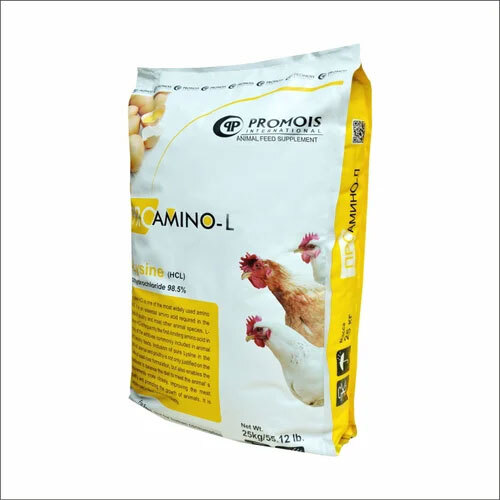L Lysine Hydrochloride
200 INR/Kilograms
Product Details:
- Type L Lysine Hydrochloride
- Form Granule
- Suitable For Poultry
- Grade Feed Grade
- Application Fodders
- Shelf Life 1 Years
- Click to View more
X
L Lysine Hydrochloride Price And Quantity
- 200 INR/Kilograms
- 50 Kilograms
L Lysine Hydrochloride Product Specifications
- Feed Grade
- L Lysine Hydrochloride
- 1 Years
- Granule
- Poultry
- Fodders
L Lysine Hydrochloride Trade Information
- 5000 Kilograms Per Month
- 7 Days
Product Description
L Lysine Hydrochloride is a potent amino acid, an extremely bioavailable source of the essential building block lysine, broadly applied as an animal feed and pharmaceutical agent. It is instrumental in protein production, calcium metabolism, and enzyme creation, which helps the building of bodies and the regeneration of wounds. Since animals are unable to synthesize lysine, supplementation is very critical in the diet, especially in swine and poultry. L Lysine Hydrochloride improves feed conversion, skeletal growth, and well-being. It is also used in supplements related to human health to help in immune system support and even collagen production. It has great stability and solubility, which makes it versatile by ensuring the constancy of performance in different applications in the veterinary, feed, and healthcare sectors.
FAQs:
1. How is L Lysine Hydrochloride used in animal feed?
It is added to animal feed in order to maximize the profile of amino acids, optimize growth rates, and maximize feeding efficiency. It helps in the growth of muscle, especially with poultry and swine, and it helps to avoid including too much crude protein in feed formulas.
2. Is L Lysine Hydrochloride suitable for human consumption?
Yes, dietary supplements containing pharmaceutical-grade L Lysine Hydrochloride aid in providing nutritive benefits to the human body to strengthen immunity, collagen formation, and calcium absorption. It is particularly advisable in instances of stress or for persons on lysine-poor diets or those who require more protein.
3. What are the benefits of L Lysine Hydrochloride in food supplements?
It helps to keep nitrogen balance, helps to repair, and gives strength to the immune system. L Lysine Hydrochloride can also help prevent the occurrence of cold sores due to the inhibition of the herpes simplex virus replication.
4. How should L Lysine Hydrochloride be stored?
Keep in a cool, dry area not exposed to water or sunlight. It ought to be stored in a well-sealed container to keep it stable, and exposure to air or other environmental conditions prevents degradation.
Tell us about your requirement

Price:
Quantity
Select Unit
- 50
- 100
- 200
- 250
- 500
- 1000+
Additional detail
Mobile number
Email








